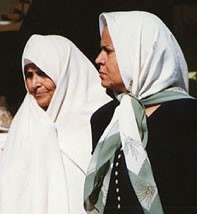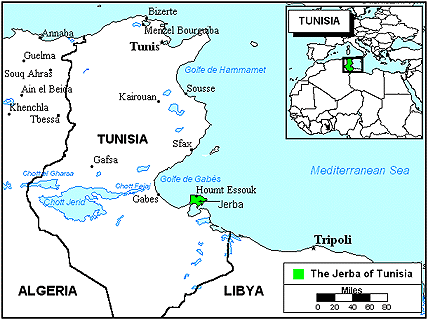The Amazigh, also known as Berbers, are the indigenous peoples of North Africa. The very name Amazigh is often translated to mean "free or noble men". There were people from North Africa present in Jerusalem at the day of Pentecost. The church was established among Berbers in the early centuries of Christianity, and some of the great North African church fathers were of Berber heritage.
When Islam swept through North Africa in the 7th century, many pockets of the Amazigh tried to fight the invasion. They resisted Islam's advance ten different times, outwardly saying they would become Muslims, but then returning to their villages and refusing to practice the religion. They intentionally built conspicuous white mosques at the top of the mountains to deceive Muslim invaders. As they passed, seeing the mosque in the distance, Arabs assumed the village had already converted and continued on their way.
Early generations of Amazigh people kept their Christian heritage in secret and outwardly submitted to Islamic rule. The symbolism of the cross is still prevalent throughout Amazigh architecture, designs on handmade carpets, and even tattoos on women's faces. Today, however, they have no understanding of their Christian heritage.
Tunisia's first president following French colonization, Habib Bourguiba (1957) worked hard to unify the country. Amazigh villages were traditionally fortified in strong mountain areas. Bourguiba incentivized the Amazigh to abandon their cultural identity in exchange for one "Tunisian Arab" identity. At first, he tried to build cities and communities down in the plains to force integration and to draw the Amazigh out of their strong mountain fortifications. When the Amazigh refused to comply, he burned their books, removed their language from schools, and worked to erase much of the culture.
The 2011 Revolution that ousted Tunisia's second president (Zine El- Abidine Ben Ali) from power sparked a renewal of the Amazigh culture and identity. Renewed pride and freedom to identify as Amazigh has resulted in many clubs, cultural centers, and organizations focused on retaining and building the Amazigh language and culture.
Amazigh of Djerba are located on the island of Djerba, in the south of Tunisia. We will call them Djerba Amazigh. Their heart language is Nafusi, though most also speak Tunisian Arabic.
In general, many Djerba Amazigh have lost aspects of their traditional identity. Amazigh clothing has changed due to integration with the Arabs of Djerba. Many now wear modern clothes making it difficult to distinguish from merely outward appearances the Djerba Amazigh from other ethnic groups.
The interactions between men and women more closely follow the Bedouin tradition that came with Islam from the Arabian Peninsula. Men and women do not mix socially, and they continue to wear their traditional clothing.
Some Djerba Amazigh are potters; this profession has been passed on for generations. It is considered the profession of their ancestors which cannot be abandoned. With the passing of time, evolving material needs, and difficulty of the profession, however, the youth have begun to search out work in industrial and commercial locations. Other Djerba Amazigh work in commerce. They farm olive trees and produce olive oil. The Djerba Amazigh inhabitants of the village of Oursighen are well off. Members of the family may live abroad, often in Europe, sending back money to their families. The Djerba Amazigh use audio-visual media like radio and television, and their youth use the Internet.
Djerba Amazigh people follow the teaching of Mohammad, who lived in the 6-7th centuries in Saudi Arabia. They believe in one God, whom they call Allah (Arabic for "the God"). At judgment day, all people will be judged for their deeds and, if their good works outweigh their bad, then Allah will welcome them into paradise. If not, then they will be sentenced to eternal hell. They must follow the five pillars of Islam: pray five times a day, fasting from dawn to dusk during the month of Ramadan, giving to the poor, and, if possible, a pilgrimage to Mecca, to be done at least once in their lifetime (Hajj). Regarding Jesus, they believe that he was a prophet, but that his teachings are inferior to those of Mohammad. They also believe the Bible has gained inaccuracies through the centuries.
More specifically, the Djerba Amazigh are Ibadi Muslims, following the Ibadi school of Islam. Their denomination distinguishes them from the majority of Tunisian Muslims who follow the Maliki school. Ibadi Muslims believe that the real Muslim is the one who practices, not just in word, but also in deed. They are considered peaceful people who generally do not look down on other Muslims. Other Muslim denominations, conversely, may look down on and sometimes persecute Ibadi Muslims. The rest of Tunisian Muslims, of the Maliki school, see the Ibadi Amazigh as outsiders.
The Djerba Amazigh people have put their identity in the Islamic religion and their nationality. They need an identity based on the King of kings who gave his life to give them eternal life.
Pray for the Holy Spirit to give dreams and visions to family leaders among each Amazigh group.
Pray for the Lord to thrust out dedicated workers to the Djerba Amazigh.
Pray for Amazigh disciples in Tunisia to make more disciples.
Scripture Prayers for the Berber, Djerba in Tunisia.
http://islam.uga.edu/ibadis.html
https://storymaps.arcgis.com/stories/c83c8e6e455e4d49854e2bd44281733c
https://www.lonelyplanet.com/articles/exploring-the-berber-towns-and-culture-of-tunisia
| Profile Source: Joshua Project |











